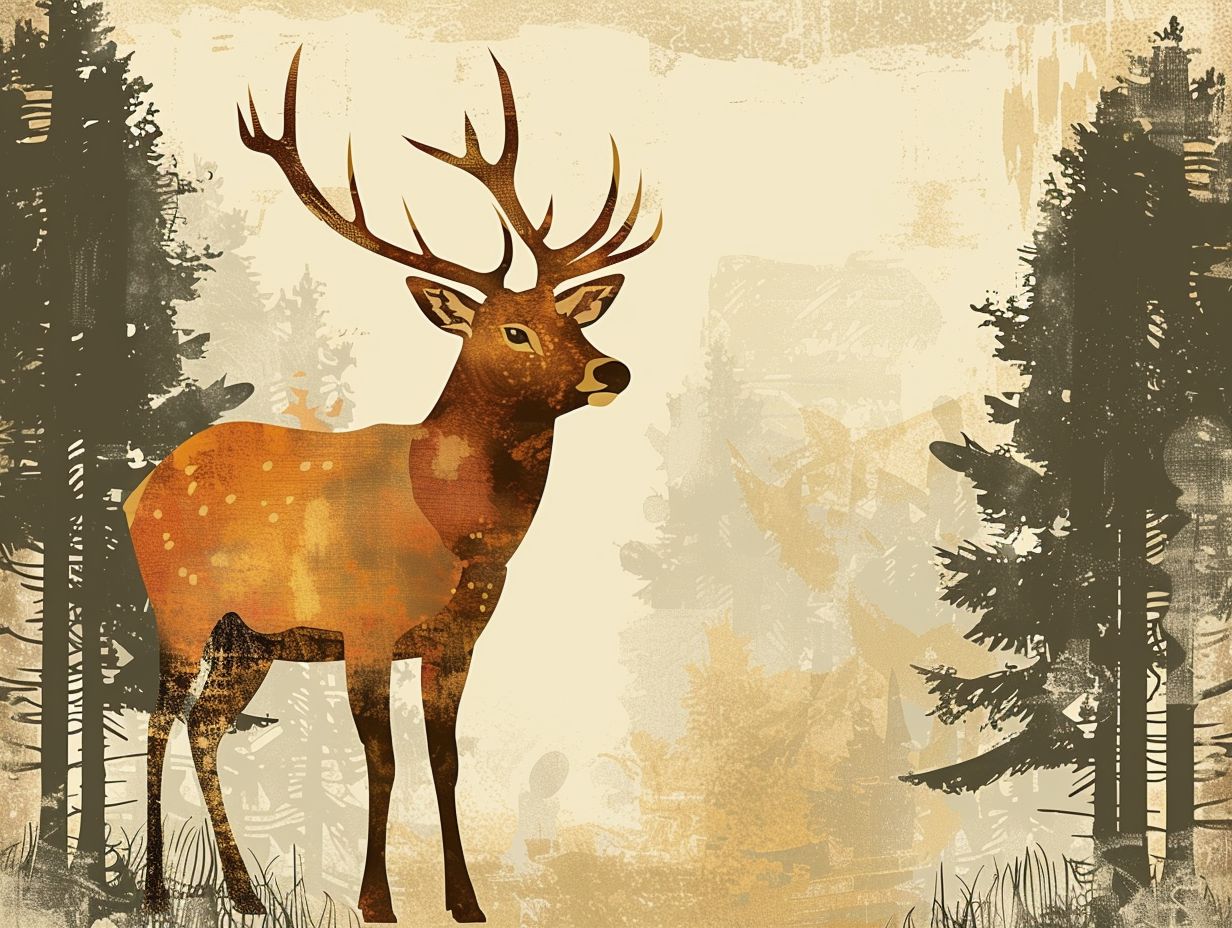Does Deer Antler Velvet Cause Hair Loss

Deer antler velvet has been gaining popularity for its potential health benefits, but there are concerns about its effects on hair loss.
We will explore what exactly deer antler velvet is, its potential uses, and whether it can cause hair loss.
We will also discuss the possible side effects of deer antler velvet, its interactions with other medications, and its safety for pregnant women.
We will delve into how deer antler velvet is extracted, the different forms it comes in, and how to choose a high-quality supplement.
Stay tuned to learn more about the claims surrounding deer antler velvet and hair loss, and whether there is scientific evidence to support them.
Key Takeaways:

- Deer Antler Velvet is a supplement made from the fuzzy antler covering of deer.
- While there are various potential uses for Deer Antler Velvet, there is no scientific evidence to support claims that it causes hair loss.
- Possible side effects of Deer Antler Velvet include interactions with medications and potential risks for pregnant women.
Does Deer Antler Velvet Cause Hair Loss?
One common query revolves around whether Deer Antler Velvet contributes to hair loss or if it aids in hair growth through its interactions with cells and growth factors like IGF-I.
Research suggests that the bioactive components present in Deer Antler Velvet may have a positive impact on hair follicle development and regeneration processes. Studies have shown that these components can influence the expression of genes related to hair growth and cellular proliferation.
The role of IGF-I in promoting hair growth is of particular interest, as it is known to play a crucial role in stimulating cell growth and differentiation. By modulating the activity of hair follicle stem cells, IGF-I can potentially enhance the hair growth cycle and lead to thicker, healthier hair.
What Are the Possible Side Effects of Deer Antler Velvet?
Understanding the potential side effects of Deer Antler Velvet is crucial, particularly in terms of skin permeations and effects on the erythema index.
Studies have shown that the application of Deer Antler Velvet topically can lead to changes in skin permeability, potentially affecting the absorption of other substances.
Alterations in the erythema index, a measure of skin redness, have been observed in individuals using products containing Antler Velvet extract.
Some reported adverse reactions include skin irritation, rash, or allergic responses, although these occurrences are relatively rare and vary depending on individual sensitivities.
Can Deer Antler Velvet Interact with Other Medications?

Deer Antler Velvet may interact with other medications due to its bioactive nature, especially when consumed in the form of supplements or particular formulations containing specific bioactive ingredients.
This interaction can be significant, as Antler Velvet contains a variety of bioactive compounds like growth factors, amino acids, and minerals that may impact the body’s absorption and utilization of certain medications. Individuals considering taking Antler Velvet alongside their prescribed medications should consult a healthcare provider to evaluate any potential risks or benefits, especially in cases where there are concerns about nutrient interactions or contraindications.
Is Deer Antler Velvet Safe for Pregnant Women?
The safety of Deer Antler Velvet for pregnant women remains a topic of concern, especially considering the extract-loaded nature of certain formulations and potential effects on maternal health.
Research has shown that high concentrations of growth factors and hormones in Antler Velvet extracts could potentially disrupt hormonal balance during pregnancy, posing risks to both the mother and the developing fetus.
Studies indicate that unregulated consumption of these products may lead to complications such as abnormal fetal development, hormonal imbalances, and even miscarriage.
Health experts recommend pregnant women to exercise caution and consult healthcare professionals before incorporating any Antler Velvet supplements into their prenatal regimen to avoid any potential adverse effects.
How is Deer Antler Velvet Extracted?
The process of extracting Deer Antler Velvet involves intricate methods to isolate the bioactive protein components from deer antlers while preserving their potency and quality.
One of the key techniques used in Antler Velvet extraction is protein isolation, which involves separating the protein-rich elements from the rest of the antler structure. This step is crucial to concentrate the bioactive compounds for further processing.
Deer selection plays a vital role in this process, with careful consideration given to factors like age, health, and diet. Younger, healthier deer are often chosen for their higher protein content and bioavailability, contributing to a more potent final product.
To ensure the preservation of bioactive compounds, extraction methods are optimized for minimal degradation. Techniques such as freeze-drying and low-temperature processing are commonly employed to maintain the integrity and efficacy of the extracted components.
What Are the Different Forms of Deer Antler Velvet?
Deer Antler Velvet is available in various forms such as supplements, formulations, and extract-loaded products, catering to diverse preferences and consumption methods.
These different types of Antler Velvet offer distinct benefits and applications. Supplements are often preferred for easy consumption and dosage control, while formulations may provide targeted effects for specific health concerns. Extract-loaded products are known for their concentrated potency, offering quick absorption and potentially heightened results.
Consumers can choose from a range of concentrations, including low to high extracts, to suit their individual needs. The variety in available Antler Velvet products allows individuals to tailor their supplementation to align with personal health goals and preferences.
What is the Difference Between Deer Antler Velvet Extract and Powder?
Distinguishing between Deer Antler Velvet extract and powder lies in the concentration of biomacromolecular proteins and bioactive compounds, affecting their potency and effectiveness in various applications.
Antler Velvet extract, being more concentrated, is often favored for therapeutic purposes due to its higher protein content, making it beneficial for muscle recovery and joint health.
On the other hand, Antler Velvet powder, despite a lower protein concentration, is preferred in dietary supplements for its easier incorporation into various products and higher bioavailability.
Studies have shown that Antler Velvet extract contains a higher concentration of IGF-1, a growth factor linked to tissue repair and regeneration, while the powder form provides a more versatile option for daily supplementation.
What Are the Benefits of Using Deer Antler Velvet Spray?

Deer Antler Velvet spray offers unique advantages in terms of growth promotion, skin rejuvenation, and targeted application, making it a convenient option for those seeking specific benefits.
One of the key benefits of utilizing Antler Velvet spray is its ability to deliver essential nutrients directly to the body’s cells through targeted application. This targeted delivery mechanism ensures that the growth-promoting properties of the velvet are effectively absorbed, maximizing its effectiveness.
The skin-enhancing effects of Antler Velvet spray can provide noticeable improvements in skin tone, elasticity, and overall texture, making it a popular choice for individuals looking to enhance their skin health.
The ease of use and quick absorption further contribute to the practical applications of this natural supplement, offering a convenient solution for those looking to boost their overall well-being.
How to Choose a High-Quality Deer Antler Velvet Supplement?
Selecting a high-quality Deer Antler Velvet supplement requires attention to factors such as serum formulations, purity levels, and bioavailability to ensure optimal benefits and efficacy.
When assessing serum formulations, it is crucial to look for supplements that utilize advanced extraction techniques to concentrate the bioactive compounds found in Deer Antler Velvet.
Additionally, purity standards play a critical role in ensuring the product is free from contaminants and pollutants that could compromise its efficacy.
Quality control measures, including third-party testing and compliance with industry regulations, are vital in guaranteeing the safety and consistency of the supplement.
What Are the Alternatives to Deer Antler Velvet?
Exploring alternatives to Deer Antler Velvet involves considering other bioactive formulations and growth-promoting factors that offer similar health benefits and support various physiological functions.
One viable alternative to Deer Antler Velvet is Velvet Bean Extract which contains L-DOPA, a precursor to dopamine, known for its neuroprotective and growth-promoting properties.
A potent alternative could be Colostrum Supplements, rich in insulin-like growth factors (IGFs) that play a crucial role in cell growth and regeneration.
For those seeking similar benefits, Whey Protein Isolate stands out due to its high concentration of essential amino acids, vital for muscle repair and growth.
What Are the Claims Surrounding Deer Antler Velvet and Hair Loss?
The claims linking Deer Antler Velvet to hair loss have sparked debates, with proponents suggesting its beneficial effects on hair health due to specific biomacromolecular proteins and growth factors.
The scientific community remains divided on the efficacy of Deer Antler Velvet in promoting hair growth. Some studies have shown potential benefits of the protein and growth factor composition in Antler Velvet that could support hair follicle health, but the evidence is not yet conclusive. Critics argue that more rigorous research is needed to establish the direct link between Antler Velvet and hair loss prevention.
It is crucial to approach these claims with a critical mindset and further investigations are warranted to determine the true effects of this traditional remedy on hair health.
Is There Any Scientific Evidence to Support These Claims?
Evaluating the scientific evidence regarding Deer Antler Velvet’s impact on hair loss requires scrutiny of studies involving IGF-I and Human Dermal Papilla Cells to ascertain its efficacy and potential mechanisms of action.
Studies have shown that IGF-I, a growth factor present in Deer Antler Velvet, plays a crucial role in hair follicle development and maintenance. Research indicates that IGF-I promotes hair growth by stimulating Human Dermal Papilla Cells, which are essential for regulating hair follicle activity.
Clinical trials have demonstrated promising results, suggesting that the bioactive compounds in Deer Antler Velvet may aid in combating hair loss and promoting hair regrowth. Understanding these mechanisms at a cellular level is vital in determining the actual benefits of Deer Antler Velvet for individuals experiencing hair loss.
Frequently Asked Questions

Does Deer Antler Velvet Cause Hair Loss?
Yes, there is a possibility that deer antler velvet can cause hair loss. This is because it contains a hormone called insulin-like growth factor-1 (IGF-1) which has been linked to hair loss in some cases.
How does IGF-1 in Deer Antler Velvet cause hair loss?
IGF-1 is a hormone that promotes cell growth, including hair cells. However, too much of it can lead to an overproduction of cells, which can ultimately lead to hair loss.
Is there any research to support the link between Deer Antler Velvet and hair loss?
While there is limited research on this specific topic, studies have shown that IGF-1 can play a role in hair loss. More research is needed to fully understand the connection between deer antler velvet and hair loss.
Can using Deer Antler Velvet supplements lead to hair regrowth?
There is no scientific evidence to suggest that deer antler velvet can promote hair regrowth. In fact, excessive use of IGF-1 can potentially worsen hair loss.
Are there any other side effects of taking Deer Antler Velvet?
In addition to hair loss, other potential side effects of taking deer antler velvet include stomach upset, headache, and allergic reactions. It is important to consult with a healthcare professional before taking any supplements.
Are there any alternatives to Deer Antler Velvet for promoting hair growth?
Yes, there are other supplements and natural remedies that may help promote hair growth such as biotin, saw palmetto, and rosemary oil. It is always recommended to consult with a healthcare professional before trying any new supplement.